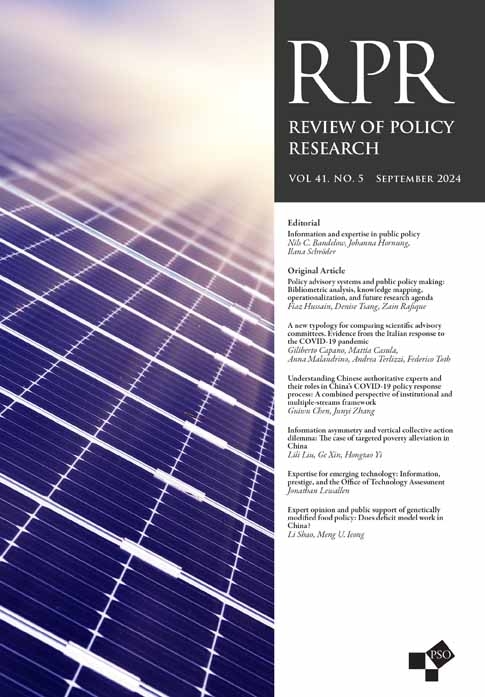Expertise for emerging technology: Information, prestige, and the Office of Technology Assessment
Abstract
enPolicy makers often struggle to adapt and respond to the uncertainties and ambiguities associated with new and emerging technologies. In such situations decision makers often widen their search for information and acquire more expertise in order to better define complex problems and to understand the potential consequences of proposed alternatives. I argue that acquiring information also carries social and symbolic value: having reports and other kinds of information provided to you signals that you are a policy maker important and influential enough to keep informed. The Office of Technology Assessment (OTA) provided the US Congress with nonpartisan reports on technology-related issues from 1972 until 1995 when its funding was zeroed out. Using data on all OTA reports published from 1974 to 1995, I find evidence that, while almost every committee requested at least one report, the reports largely were concentrated among a few committees in each chamber. The committees more likely to request reports also tended to be lower in prestige among members; acquiring OTA reports thus helped raise the committee leaders' profile on science and technology-related issues but was not directly related to the surrounding issue environment or immediate legislative efforts. OTA reports also were concentrated on a relatively small number of policy issues, which further suggests inequalities in the dynamics of expertise in policy making.
摘要
zh政策制定者常常难以适应和响应与新兴技术相关的不确定性和模糊性。在这种情况下,决策者通常会扩大信息搜索范围并获取更多专业知识,以便更好地定义复杂问题并理解提议的替代方案的潜在结果。我论证,信息获取还具有社会价值和象征价值:向某人提供报告和其他类型的信息,表明其是一位重要且有影响力的、能随时了解情况的决策者。美国国会技术评估办公室(OTA)在1972年到1995年(其资金被清零)期间,向美国国会提供了技术相关问题的无党派报告。使用1974年至1995年发布的所有OTA报告的数据,我发现证据表明,虽然几乎每个委员会都要求获取至少一份报告,但这些报告主要集中在每个议院的少数几个委员会中。更有可能要求获取报告的委员会在成员中的威望也往往较低;因此,获取OTA报告有助于提高委员会领导人在科技相关议题上的形象,但与周围的议题环境或直接的立法工作没有直接关系。OTA报告也集中于相对较少的政策议题,这进一步表明了政策制定中专业知识动态的不平等。
Resumen
esLos formuladores de políticas a menudo luchan por adaptarse y responder a las incertidumbres y ambigüedades asociadas con las tecnologías nuevas y emergentes. En tales situaciones, quienes toman decisiones a menudo amplían su búsqueda de información y adquieren más experiencia para definir mejor problemas complejos y comprender las posibles consecuencias de las alternativas propuestas. Sostengo que adquirir información también conlleva un valor social y simbólico: que te proporcionen informes y otros tipos de información indica que eres un formulador de políticas lo suficientemente importante e influyente como para mantenerte informado. proporcionó al Congreso de los Estados Unidos informes no partidistas sobre cuestiones relacionadas con la tecnología desde 1972 hasta 1995, cuando su financiación se redujo a cero. Utilizando datos de todos los informes de la OTA publicados entre 1974 y 1995, encuentro evidencia de que, si bien casi todos los comités solicitaron al menos un informe, los informes se concentraron en gran medida entre unos pocos comités de cada cámara. Los comités que tenían más probabilidades de solicitar informes también tendían a tener menor prestigio entre sus miembros; Por lo tanto, la adquisición de informes de la OTA ayudó a elevar el perfil de los líderes del comité en temas relacionados con la ciencia y la tecnología, pero no estuvo directamente relacionado con el entorno del tema circundante ni con los esfuerzos legislativos inmediatos. Los informes de la OTA también se concentraron en un número relativamente pequeño de cuestiones de política, lo que sugiere aún más desigualdades en la dinámica de la experiencia en la formulación de políticas.
CONFLICT OF INTEREST STATEMENT
The author does not have any conflicts of interest associated with this manuscript.




